When shopping for fragrances, you’ll often come across terms like perfume, cologne, and eau de toilette. But what sets them apart? Here’s a direct breakdown:
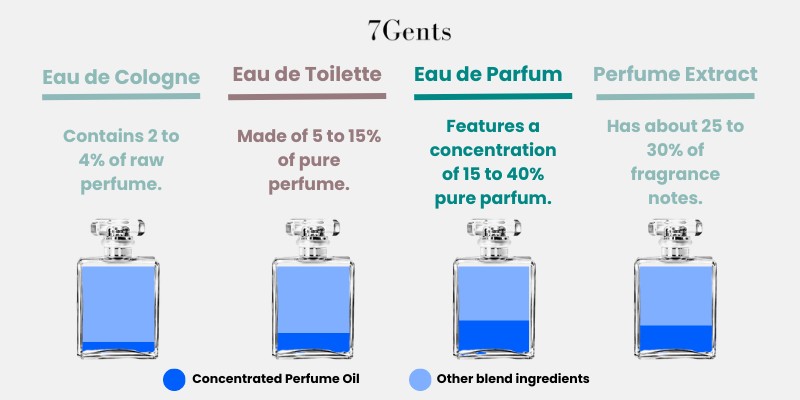
- Eau de Cologne (EDC): Contains 2 to 4% of raw perfume.
- Eau de Toilette (EDT): Made of 5 to 15% of pure perfume.
- Eau de Parfum (EDP): Features a concentration of 15 to 40% pure parfum.
- Perfume Extract: Has about 25 to 30% of fragrance notes.
What many don’t know is that these aren’t just different names, they represent the different concentrations and longevity of scents. Keep reading on to find out more about these differences and why they matter, so you can make an informed choice for your next fragrance purchase.
The Differences Between Perfume, Cologne, and Eau de Toilette Explained
So, eau de parfum, eau de cologne, and eau de toilette; they all smell good, right? But what makes them different? Here’s the best way to look at the differences:
Perfume
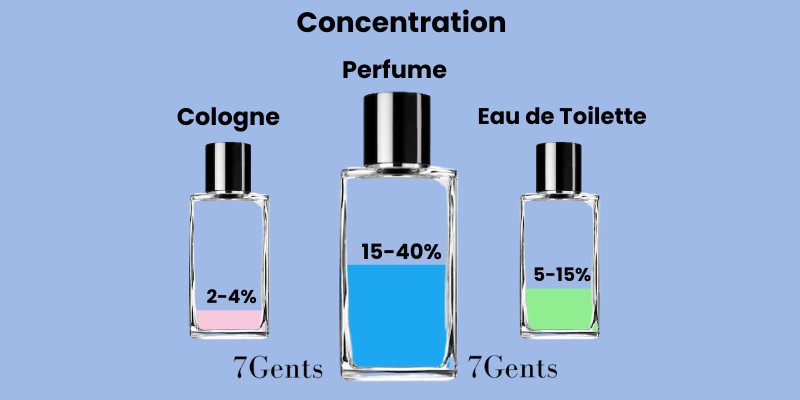
When you hear the term “perfume,” “extrait de parfum,” or “eau de parfum” it refers to the most concentrated form of fragrance on the market. Eau de parfums boast the highest concentration of aromatic compounds, after pure parfum, typically falling between 15% to 40%.
Thanks to this high concentration, perfumes offer a scent that can linger for hours. Some top-tier perfumes can envelop you in their aroma for up to 24 hours. Creed is an example of a perfume house that largely creates fragrances of an eau de parfum concentration.
Eau de parfums are crafted with a balanced blend of fragrance oil, aroma compounds, and solvents, so they’re a true symbol of the art of fragrance creation. Because of how rich and potent they are, perfumes are ideal for special occasions or evening wear. So, if you’re someone who leans towards a more pronounced and long-lasting scent, perfume is your go-to.
The intricate blend and high concentration mean that perfumes usually come with a heftier price tag, which is why they’re generally the most expensive form in the fragrance world. To sum it up, when you go for a perfume, you’re choosing depth, longevity, and a scent that really makes a statement.
Cologne
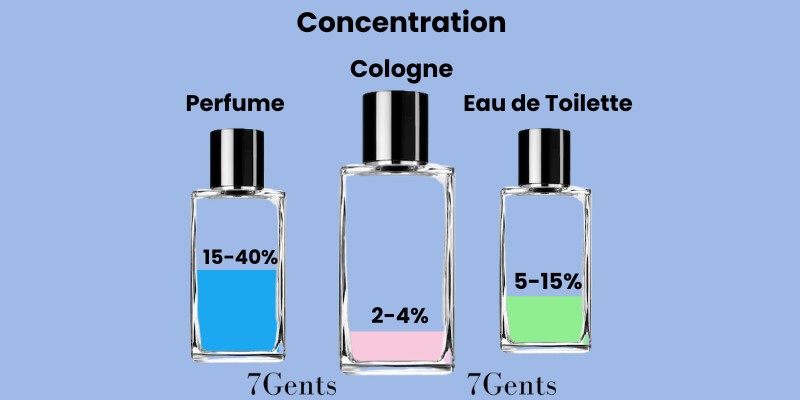
Unlike the richer eau de parfum or the potent perfume, cologne has a modest concentration of aromatic compounds, usually hovering between 2% to 4%. Originally, eau de colognes had a traditional recipe that used citrus notes and herbs but nowadays it just refers to any blend crafted by harmoniously merging essential oils with alcohol and water.
What sets cologne apart? It generally has a signature light and invigorating scent, which is why most colognes feature citrus notes like orange blossom or notes like ocean breeze. Traditionally, colognes have been a staple in men’s fragrance wardrobes. But, the fragrance game has changed, and today, there are colognes that are crafted for women too.
Because of their lower concentration, colognes don’t linger as long as perfumes. So, if you’re wearing a cologne, you might find yourself reaching for the bottle for a touch-up now and then. But here’s the silver lining: colognes are perfect for those who like leaving a subtle scent trail.
Their airy nature makes them a top pick for everyday wear. And if you’re stepping out on a sun-drenched day or live in a warmer climate, a spritz of cologne can be refreshingly pleasant. Overall, cologne offers a delicate fragrance embrace, not too much and not too little.
Eau de Toilette
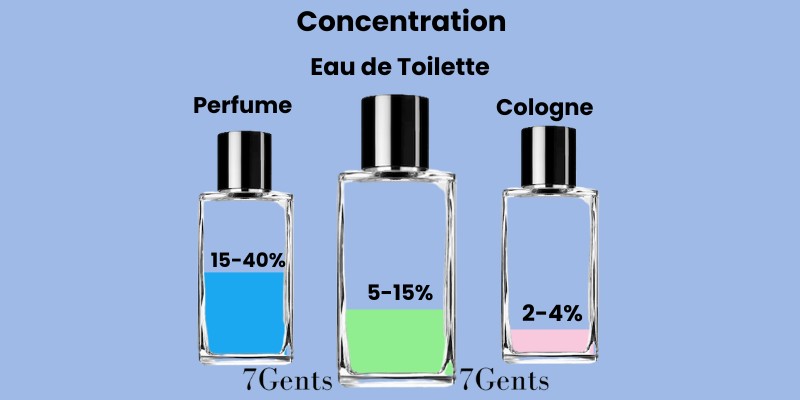
Eau de toilette comes from the French phrase “faire sa toilette,” which means “getting ready”.
Eau de toilette (EDT) is pretty much in the middle ground in terms of fragrance concentration, sitting comfortably between the intense perfume and the lighter cologne. An eau de toilette typically has an aromatic compound concentration ranging from 5% to 15%. This blend is achieved by combining these compounds with alcohol and water, creating a balanced scent profile.
So, why go for an eau de toilette? EDTs present the perfect blend of longevity and affordability. While they don’t linger as long as the more concentrated perfume, they do offer a scent that can gracefully accompany you for several hours. Also, when it comes to price, EDTs are generally more wallet-friendly than perfumes.
Another reason why a lot of people are fans of eau de toilettes is their versatility. They’re a universal favorite, suitable for both men and women. Whether you’re heading to work, a casual brunch, or a weekend outing, an EDT can be your perfect scent companion.
In short, eau de toilette offers a fragrance experience that’s neither too overpowering nor too fleeting, which is why it’s a popular choice for many fragrance enthusiasts.
Factors to Consider When Choosing Which Type of Fragrance to Pick
Choosing the right fragrance, be it perfume, eau de cologne, or eau de toilette, depends on several key considerations:
- Longevity: How long do you want your scent to linger? Perfumes, with their high concentration, promise an enduring aroma, sparing you frequent touch-ups. On the other hand, eau de cologne and eau de toilette, due to their lighter nature, might call for occasional reapplication throughout your day.
- Strength: If you want a bold fragrance statement, perfumes, rich in fragrance oils, are your best bet. They stand out with their pronounced aroma. In contrast, eau de cologne and eau de toilette offer a more understated, subtle scent trail.
- Budget: Whether we like it or not, budget always plays a pivotal role. Perfumes, given their concentration, often come with a premium price tag. But, if you’re looking for something more pocket-friendly without compromising on the fragrance experience, colognes and eau de toilettes are worth exploring.
- Occasion: Context matters. Perfumes, with their luxurious scent, are ideal for formal gatherings or evening soirees. Meanwhile, the breezy aroma of colognes and eau de toilettes makes them ideal for everyday wear or laid-back occasions.
- Personality: Fragrances are an extension of your personality. Some might lean towards bold and distinctive scents, while others might prefer something subtle and understated. So, you always have to choose a fragrance that aligns with your character and the impression you wish to convey.
- Skin Type: Believe it or not, your skin type can influence how a fragrance smells on you. Oily skin tends to intensify the scent, making it last longer, while dry skin might require more frequent reapplication.
It’s always a good idea to test a fragrance on your skin before making a final decision, as, in some cases, people can even be allergic to a certain type of fragrance oil or ingredient.
It may seem like I’m just throwing stuff at you here but trust me, understanding these factors is an important step in finding a scent that works for you.
FAQs
How long does each fragrance type last on the skin?
Eau de parfum, with its high concentration, offers the most enduring aroma, often lasting up to 24 hours. In contrast, eau de cologne, being lighter, might fade within a couple of hours. EDT finds a middle ground, usually lingering for several hours before a touch-up might be needed. Do note that this may also vary depending on factors like skin type and body temperature.
Can men use perfumes or are they just for women?
Yes, men can wear perfumes. In fact, “Dior Sauvage,” which is technically a perfume, is worn by many men. Perfumes aren’t gender-exclusive, it’s all about personal preference. Whether it’s perfume, eau de cologne, or EDT, the choice boils down to the scent that resonates with the individual. Sauvage comes in an EDT and an EDP, which I’ve created a comparison guide on.
Is there a difference between cologne and eau de toilette?
Yes, while sometimes used interchangeably, they differ in concentration. Eau de cologne has a more subtle scent due to its lower concentration, whereas eau de toilette offers a slightly richer fragrance profile.
Is eau de toilette suitable for daily use?
Absolutely! Eau de toilette, with its well-balanced blend of longevity and affordability, is a top pick for daily wear. Its moderate scent strength makes it an ideal choice for both casual outings and work environments.
Is eau de parfum the best fragrance type?
Eau de parfum is a favorite for many because of its balanced concentration and lasting power. The “best” is always going to be subjective and varies from person to person, but many prefer eau de parfum as it offers a longer-lasting scent compared to some other fragrance types.
If you’re looking for a fragrance that lingers without being overpowering, eau de parfum might be an excellent choice for you. If not, then anything other than eau de parfum will serve you well.
Conclusion
When it comes to fragrance types, there’s a lot to consider and wrap your head around. From the potent perfume to the airy cologne and the balanced eau de toilette, all the options can make choosing hard. Nonetheless, just remember that perfumes envelop you in a rich aroma, while eau de cologne offers a subtle freshness. Eau de toilette, with its middle-ground concentration, is ideal for everyday wear.
Your choice should align with your preferences, budget, and the occasion, as well as your skin type. Remember, each fragrance type has its unique charm and essence. So, when you select one, bear in mind that you’re not just picking a scent, you’re embracing an experience tailored to your personality and needs. Choose wisely and wear your fragrance with confidence.

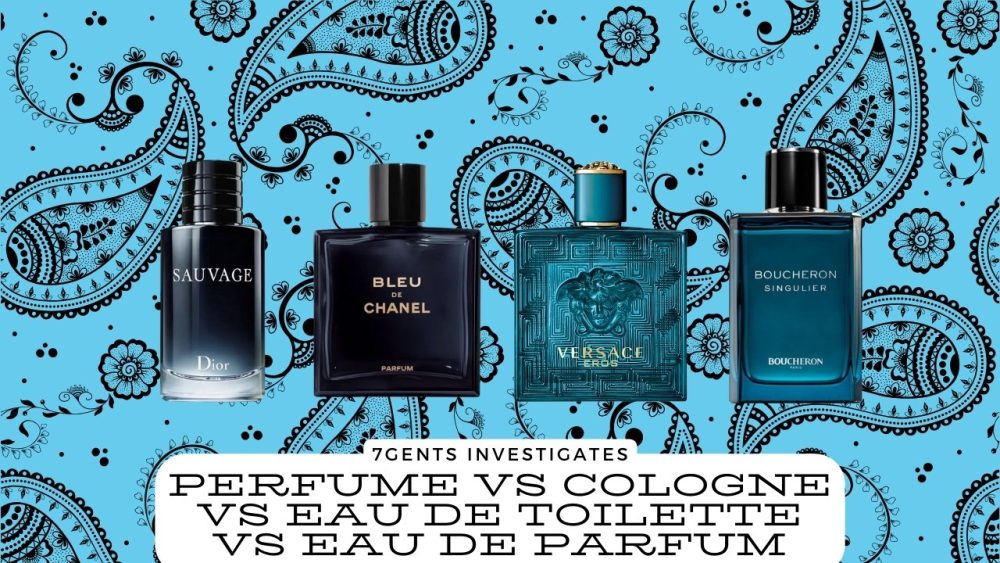

Write a comment